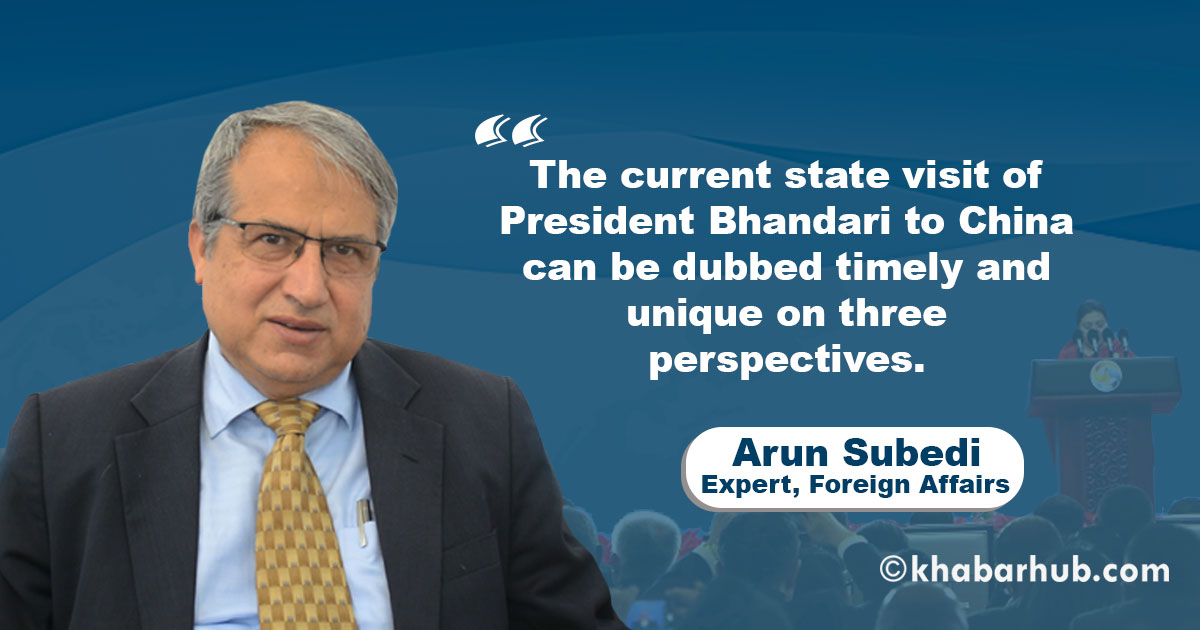0%

President Bidya Devi Bhandari is currently on a nine-day state visit to China. The visit comes at a time Nepal has been eagerly awaiting a visit by the Chinese President since 2015. As Nepal and China are linked in many ways, it is doubtless that such high-level visits between the countries will foster bilateral ties.
The current state visit of the president can be dubbed exceptional on three perspectives. Firstly, the visit comes at a time when the government has registered a bill to enable the Prime Minister alone to recommend army mobilization, crossing the jurisdiction set by the constitution to President (Supreme Commander-in-Chief of Nepal Army) to mobilize the army. It has forced to rethink the relation between the President and the Prime Minister.
Secondly, the government was dragged into dispute following its opinion on Indo-Pacific Command. It saw China not inviting Nepal to the Boao Summit. During his visit to China in June 2018, Prime Minister KP Oli had failed to create an environment of trust between the two countries. In this context, the state visit by President Bhandari can be considered a significant one.
India has been publicly conveying its reservation over BRI since long. But, as it is currently busy with the elections, it is yet to come up with any direct or indirect response over President Bhandari’s China visit through diplomatic channels.
Thirdly, this visit by a ceremonial president looks like a visit by an executive president. Protocols that should be proceeded by an executive head are to set be signed in the presence of a ceremonial president.
Initially, Nepal was left out in the master plan of the Belt and Road Initiative (BRI) and China worked strategically to include Nepal in the BRI. The mapping of BRI has been made in such a way that it would encompass India. Hwever, India has been expressing reservation over it. In such a context, President Bhandari’s visit holds a substantial meaning.
India has been publicly conveying its reservation over BRI since long. But, as it is currently busy with the elections, it is yet to come up with any direct or indirect response over President Bhandari’s China visit through diplomatic channels.
The chances that President Xi will visit Nepal this year looks slim owing to Nepal’s weak infrastructure.
It is likely that India will respond on Nepal’s presence in the BRI summit after evaluating the diplomacy Nepal exhibits at the summit. The response will be influenced by the political scenario that will be created after the Indian elections.
Nepal has been hoping for a visit by the Chinese President since 2015. But, what has to be considered is whether the available infrastructure here can handle Chinese President Xi Jinping’s visit. Nepal needs to consider seriously its infrastructure before expecting such high-level political visits.
There has been a huge hue and cry over the government’s decision to procure choppers for travel of VVIPs including the president, vice president, prime minister and foreign VVIPs visiting Nepal. In such a scenario, the question is whether Nepal will be able to manage the Chinese President’s visit.
The chances are slim that President Xi will visit Nepal this year owing to Nepal’s weak infrastructure.
A serious point that we need to consider is that President Bhandari was to visit the Beijing-Huawei office, which was not in the itinerary. President Bhandari’s visit to Huawei could have incited controversies since the telecommunication giant is currently in a tech war with the USA and its allies. The President’s cancelation of the visit is, in fact, a positive move.
Views expressed in this article are the author’s own and do not necessarily reflect the editorial stance of Khabarhub.